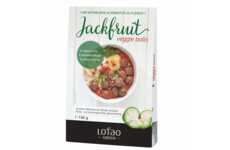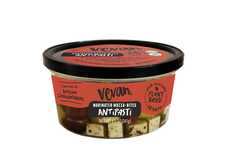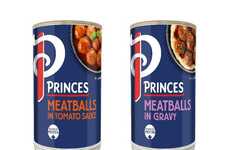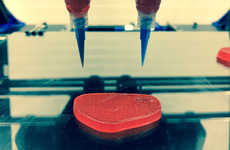



3D-printing technology has entered the plant-based meat alternative industry
Trend - Plant-based meat alternatives are becoming increasingly similar to real meat in texture and flavor due to 3D-printing technology. The technology allows plant-based protein products to mimic meat in its various forms, giving consumers more variety in this food category.
Insight - The alternative meat industry is no longer exclusive to those with vegetarian and vegan dietary needs. Meat-eating consumers are turning to plant-based options for health and environmental reasons, which has motivated companies to increase their product innovation. To help consumers adjust to the meatless products, the plant-based food items are taking on a more realistic meat-like texture and flavor that creates a sense of familiarity for those experimenting in this category.
Insight - The alternative meat industry is no longer exclusive to those with vegetarian and vegan dietary needs. Meat-eating consumers are turning to plant-based options for health and environmental reasons, which has motivated companies to increase their product innovation. To help consumers adjust to the meatless products, the plant-based food items are taking on a more realistic meat-like texture and flavor that creates a sense of familiarity for those experimenting in this category.
Workshop Question - How can your brand adjust its products to accommodate new consumer groups?
Trend Themes
1. 3D Printing Technology in Plant-based Meat Alternative - The use of 3D printing technology is enabling plant-based meat alternatives to mimic the texture and flavor of real meat, providing a wider range of options for meat-eating and environmentally-conscious consumers.
2. Sensorial Parameters Refine Plant-based Meat Products - Companies are utilizing a range of sensorial parameters, from juiciness and fat distribution to mouthfeel, to create new plant-based meat products that closely mimic the taste and texture of real meat, catering to a broader range of consumers and dietary preferences.
3. Companies Developing Plant-based Seafood with 3D Printing - Innovative companies are using 3D printing technology to create plant-based seafood alternatives with the same nutritional value as real seafood, but without the negative environmental and ethical impacts typically associated with fishing and farming practices.
Industry Implications
1. Food Manufacturing - Companies in the food manufacturing industry can utilize 3D printing technology and sensorial parameters to create new, innovative plant-based meat products that cater to a broader range of consumers.
2. Sustainable Agriculture - As the plant-based meat industry grows, companies involved in sustainable agricultural practices can benefit from the increased demand for plant-based ingredients, providing a more environmentally friendly alternative to traditional livestock farming methods.
3. Technology and Innovation - The use of 3D printing technology in the food industry is disrupting traditional manufacturing methods and creating opportunities for technological innovation, such as SavorEat's robot chef that uses artificial intelligence and machine learning to create customized menu items for diners.





















































